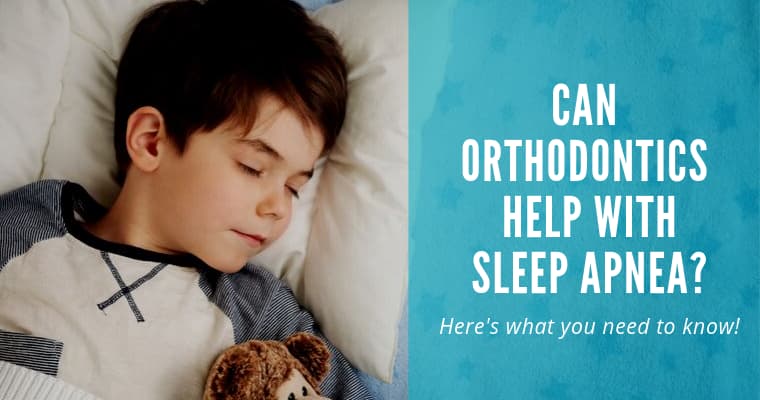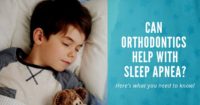
Do you or your child suffer from sleep apnea?
If so, then you may have heard how orthodontics can play a role in sleep apnea.
At Schur Orthodontics, we want you to understand the truth behind those claims. That way, you can make informed decisions for yourself or your child.
What is sleep apnea?
Opens new tab to Mayo Clinic websiteSleep apnea is a serious disorder where your breathing repeatedly stops and starts throughout your sleep.
The two main forms of sleep apnea are:
- Central sleep apnea: Where your brain is not properly controlling your breathing.
- Obstructive sleep apnea: Where your Opens new tab to view imageairway is temporarily closed off or restricted due to relaxed soft tissues in the throat.
Sleep apnea causes insufficient oxygen in the blood, which can result in:
- Excessive daytime sleepiness
- Morning headaches
- Irritability
- Delayed mental development
- Attention issues in children
It is also associated with increased risk for auto accidents, heart attacks, and strokes. Your partner may notice loud snoring, periods of not breathing during sleep, and/or gasping for air during sleep.
Watch this video to learn more about sleep apnea:
Who is at risk?
Anyone can suffer from sleep apnea, but you are at particular risk if you are a male, over the age of 50, are overweight (BMI over 34), or have a neck measurement of 17 inches for males and 16 inches for females.
Children with enlarged tonsils and adenoids are at risk as well.
Keep in mind that obstructive sleep apnea is can result from multiple factors, such as airway size, the degree to which the muscles around the throat relax, nervous system issues, and elasticity of the soft tissue.
So, how are orthodontics and obstructive sleep apnea related?
How are orthodontics and obstructive sleep apnea related?
There are many popular theories about how orthodontics and sleep apnea are related.
These include how orthodontics can cause, prevent, and cure obstructive sleep apnea.
Some believe that by extracting teeth, you reduce space for the tongue, which can predispose individuals to obstructive sleep apnea. However, Opens new tab to researchresearch shows no such relationship.
Another thought is that the expansion of your dental arches can cure or prevent airway issues. Research has shown that in children with upper jaw constriction, expanding the arch can reduce nasopharyngeal resistance and the number of apnea incidents.
On the contrary, Opens new tab to read the studyresearch also shows that certain children with mild sleep apnea can worsen with the expansion of both arches. It is also important to know that there are risks of damaging the supporting bone and gums with even minor expansion of the arches, so it should not be done as a matter of routine.
Another way orthodontics and sleep apnea are related is with adults who are treated with surgical advancement of the upper and lower jaws. Typically, those patients will have orthodontic treatment in preparation for their surgery, and their bites are refined with braces following the surgery.
What you should know about orthodontics and obstructive sleep apnea
Here are some important things our Bellevue orthodontist, Dr. Jeff Schur, wants you to know:
- Only physicians can diagnose sleep apnea. It’s important that any dentist or orthodontist involved in sleep apnea treatment do so in conjunction with a sleep physician. Dentists cannot interpret take-home sleep tests. The main role of dentists is to screen you for a risk of sleep apnea and then refer you to a sleep physician.
- A physician should evaluate any child suspected of suffering from sleep apnea before any orthodontic treatment is initiated for the purpose of addressing it. At Schur Orthodontics, we will happily work in tandem with your or your child’s physician to find a cure.
- Opens new tab to learn moreCPAP positive air pressure devices are considered the gold standard for sleep apnea treatment. However, compliance is low because patients have to wear a mask or nasal device for air delivery. If you have orthodontic or surgical treatment for airway or sleep apnea reasons, then a sleep physician should reassess you following the treatment.
- Your treating doctor should inform you of both the risks and potential benefits of any proposed treatment.
- If your or your child’s physician doesn’t seem to take your airway concerns seriously, consider consulting with a sleep physician.
- Be wary of anyone who prescribes the same treatment for everyone, dentists and orthodontists who diagnose sleep apnea, and dentists and orthodontists who treat sleep apnea without the input of a physician.
Want more information?
With this insightful information, we hope that you feel more informed about the relationship between orthodontics and obstructive sleep apnea.
If you want to learn more or have a question, feel free to contact our dental office in Bellevue, WA!
- Call us: (425) 747-4477
- Email us: info@schurorthodontics.com
P.S. Are you or someone you know looking for an orthodontist near Bellevue, Redmond, Kirkland, Seattle, Renton, or Woodinville? Dr. Schur is accepting new patient! Click here to schedule a consultation!


